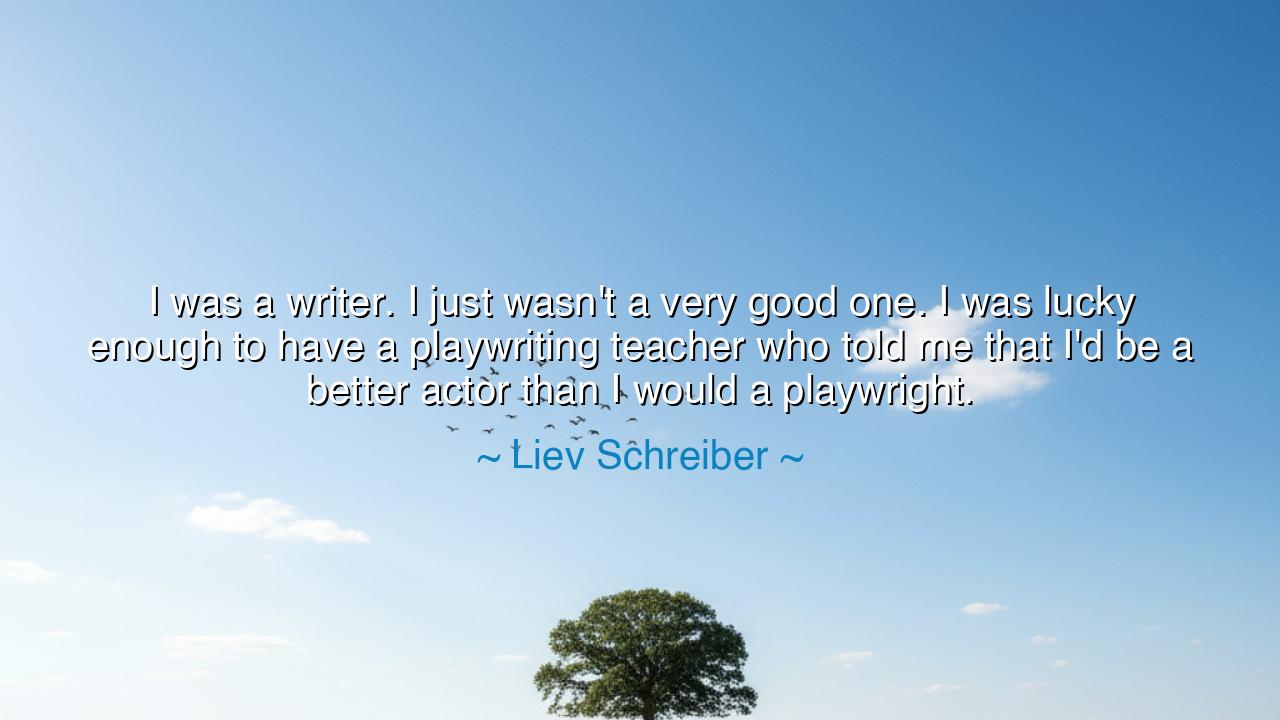
I was a writer. I just wasn't a very good one. I was lucky
I was a writer. I just wasn't a very good one. I was lucky enough to have a playwriting teacher who told me that I'd be a better actor than I would a playwright.






Liev Schreiber once spoke with humility and gratitude: “I was a writer. I just wasn’t a very good one. I was lucky enough to have a playwriting teacher who told me that I’d be a better actor than I would a playwright.” In these words lies a tale of failure transformed into destiny, of guidance that redirected a wandering soul onto the path where his true gift lay hidden. For many strive in fields that do not suit them, but the wise are those who, when corrected, embrace a new calling rather than cling to the wrong one.
The meaning of this quote rests in the power of honest mentorship. Schreiber admits his weakness as a writer, but instead of being crushed by it, he was lifted by the clarity of a teacher who recognized his deeper strength. It is not shameful to fail in one pursuit if it leads to success in another. The danger lies in blindness—refusing to see where one’s talent truly dwells. The teacher, with eyes unclouded by pride, saw in Schreiber not a playwright’s pen but an actor’s voice, presence, and soul. And because the student listened, the world gained a performer of greatness.
The origin of this wisdom is rooted in the long tradition of apprenticeship, where the master discerns what the pupil cannot see in themselves. In ancient Greece, the philosopher Socrates never claimed wisdom of his own but guided his students to discover truth within themselves. In this same spirit, Schreiber’s playwriting teacher did not flatter him with false praise but spoke with honesty that cut away illusion and revealed a brighter path. What might have seemed a rebuke became a blessing, for it turned a struggling writer into a masterful actor.
History bears witness to the power of such redirection. Consider Thomas Edison, who as a child was deemed slow by his schoolmasters. His mother, however, believed in his restless curiosity and removed him from the classroom, guiding him into the laboratory of life. The boy who was said to lack brilliance became one of the greatest inventors of his age. Or recall Vincent van Gogh, who long sought to be a preacher before realizing his true gift was not in the pulpit but on the canvas. Each story shows how failure in one realm can birth greatness in another, if one has the humility to change direction.
Schreiber’s words also reveal the courage to accept truth. Many would resist such correction, clinging to the dream of being a writer, resenting the teacher who spoke against their ambition. But wisdom lies not in stubbornness, but in adaptation. By accepting his teacher’s words, Schreiber did not abandon creativity—he transformed it, exchanging pen for stage, words for embodiment, and solitary writing for living performance. In this, we learn that every gift may find its true vessel if we are willing to be guided.
The lesson here is profound: listen when those who see you clearly speak into your life. Do not despise correction, for it may be the very key that unlocks your destiny. A single word from a trusted teacher can save you years of struggle on the wrong path. Seek out mentors, and when they speak with honesty, even if their words sting, weigh them carefully. For within their counsel may lie the redirection that will lead you to your truest calling.
Practically, this means cultivating humility and discernment. Try many paths, but be willing to leave behind what does not bear fruit. When you face failure, do not despair, but ask what it reveals about where your true strength lies. If a mentor points out your weakness, do not cling to pride—receive it as a gift. For the world is not changed by those who stubbornly insist on being what they are not, but by those who embrace fully the place where their talent burns brightest.
So let Liev Schreiber’s reflection be a teaching for all generations: to be a poor writer but a great actor is no shame, for it is better to find the right path late than to walk the wrong one forever. Trust in the eyes of wise teachers, embrace redirection, and do not fear to abandon one gift for the sake of another greater one. For in listening, in humbling oneself, and in following truth, you may yet discover the art you were born to embody.






AAdministratorAdministrator
Welcome, honored guests. Please leave a comment, we will respond soon